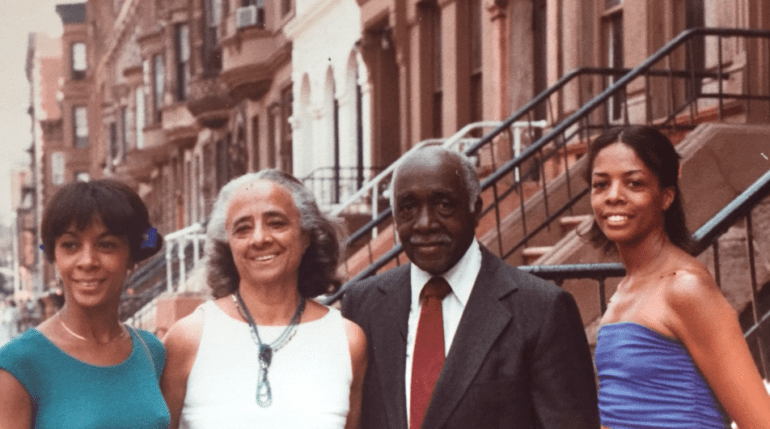“A teacher’s take: Imagine Devoting an Entire Month to White History”
A note from Carolyn Adams, Director of Education, in recognition of Black History Month
February 8, 2023

The Adams Family outside of their home in New York City c. 1970.
Where to begin? The title of this note obviously refers to the absurdity of placing the entirety of a people’s history into such a limited timeframe which, on the surface, wreaks of tokenism. Therefore, let’s agree that we are meant to take this month to acknowledge the richness and vastness of black history and become better informed about how integral it has always been to the history of the world. In 1926, historian Carter D. Woodson and the Association for the Study of African American Life and History (ASALH), launched “Negro History Week.” In so doing, they brought attention to the fact that very little was known about the history of African Americans other than that most had been brought to our shores in chains by people who, themselves, were escaping oppression. The irony of this eluded most. Negro History Week became Black History Month in 1976, to address the widespread ignorance of the achievements and contributions black people have made despite the physical, political, social, and educational barriers placed before them.
One day, while out walking with my dad, we ran into a neighbor wearing his redcap uniform on his way to work at Penn Station. My dad mentioned casually, “That guy has a Ph.D. but can’t get a job in his field.” When I was growing up in the 1940’s we would travel by train to visit relatives. Often, on arrival at a station, my mother would grip our hands as we crossed the train tracks to get to the “colored” exit to the “colored” taxis. It was a short task we performed in silence and never spoke about. To this day, when I travel by train, I often think of those tracks and our redcap neighbor and about the tragedy of discrimination, the denial of the talents and abilities of African Americans, and the conscious choice to ignore their role in the building of this nation in every field of human effort and invention. Fortunately, there is a wealth of information and there are numerous points of entry for the study of this rich history, affording the opportunity to look at history, in general, from a more integrative and holistic perspective.
Below you will find a link to some black history resources organized by discipline from The Schomburg Center for Research in Black Culture which I hope you will utilize and enjoy:
DANCE | VISUAL ARTS | THEATER | MUSIC
SCIENCE | SPORTS | LITERATURE | POLITICS
#equalgound: perspectives and stories from the Paul Taylor Dance Company community that address social justice, racial equality, and gender and sexual empowerment


